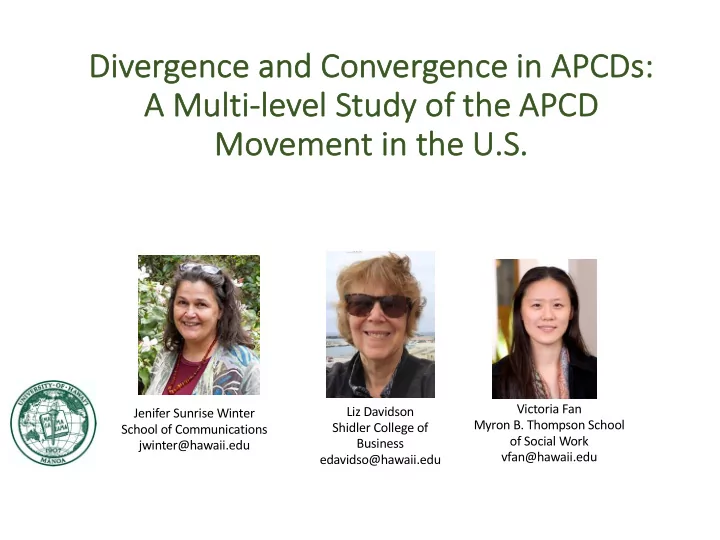

Di Divergenc nce and nd Convergenc nce in n APCDs Ds: : A M A Multi-level Study y of the APCD Mo Movem emen ent in the e U.S. Victoria Fan Liz Davidson Jenifer Sunrise Winter Myron B. Thompson School Shidler College of School of Communications of Social Work Business jwinter@hawaii.edu vfan@hawaii.edu edavidso@hawaii.edu
Our research project • How do new organizational forms of health data governance emerge, gain legitimacy, and evolve ? • APCDs as an exemplar (history, multi-state, well documented) • Longitudinal, cross-sectional (National), in-depth case studies • Study methods • Interviews (45 to date) • Participation in NAHDO (2018-2020) • Document review (NAHDO, APCD Council, state APCD websites, legislation, whitepapers, academic articles, etc.) • Finishing with data collection, analysis, and beginning reporting and feedback this fall.
Re Research insights on emergence of APCDs in US: Variability What explains the variability in this map? • “When you’ve seen one APCD you’ve seen one APCD.” • Why were some states first to adopt? • Why have some states not moved forward with an APCD? • Why do some states Our analysis as of Spring, 2020. remain voluntary? For comparison, also see: • Why is there diversity in https://www.apcdcouncil.org/state/map APCDs structure?
Re Research insights on emergence of APCDs in US: Structural Variation • Position in state governance • Division of state agency, state agency (usually DOH), designated NfP, independent NfP • Governance structure • Policy committee with key stakeholders • Data request/authorization committee • Separation of data stewardship and analytics • Data types included in APCD • Hospital discharge (y/n) • Data operations (collection & warehousing) • Outsourced (most) vs inhouse • Data release policies • Who can access or request data (very limited to very broad) • E.g., State agencies, researchers, commercial firms, public • Funding sources • State budget vs set-aside funds/tax; Medicaid admin share • Grants • Data sales
Re Research insights on emergence of APCDs in US: External Influences Increasing Healthcare costs market complexity, state regulatory oversight Community Regional APCD Initiatives council & conference Regulatory Recession change Rate regulation, ACA Grant & transparency passed other 5 th APCD/NAHDO AHRQ funding grants conference Economic CCIIO Cycle III change Insurance industry Other pushback external APCD data forces submission standards Medicaid & AI/ Machine SIM-Related learning Funds COVID-19 Pandemic & COVID-19 data Recession analysis
Res esea earch insights on em emer ergen ence e of APCDs in US: Emer ergen ence e of Use e Cases es • Managing and regulating health care markets • Cost and spending trends • Prescription and drug spending • Insurance access and coverage • Enrollment • Geographic differences • Insurance coverage • Service utilization • Price transparency • Quality-related topics • Population health • Quality improvement • Impacts of public health emergencies Challenges • Opioid epidemic drivers Limits of claims data & need to link • • COVID-19 impact (health spending, data costs) Timeliness of feeds and access to • data
Research insights on challenges and opportunities with APCDs • Challenges • Sustainability: budgets, cost increases, priorities • Payment reform and shift from claims data to APM data • Efforts to arrive at MOU / DUA for cross-department data analysis • Tensions in standardization (between states, states vs national) • Opportunities • Techniques for privacy-preserving linkages (hashing) for novel uses cases with multiple data sources • Advances in technologies (AI, machine learning) • Increasing demands for evidence-based policy making and evaluation
We would like your feedback and insights! • Suggestions for improving and extending analysis • Opportunities and challenges for APCDs you see, areas of change We plan to share our findings via technical reports to the community, after they have been vetted. Please feel free to contact us at: Jenifer Sunrise Winter jwinter@hawaii.edu Liz Davidson edavidso@hawaii.edu
Recommend
More recommend